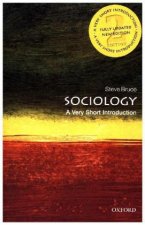
Kód: 02289543
Why Morocco missed the Arab Spring.
Autor Jan-David Franke
Essay from the year 2011 in the subject Sociology - Political Sociology, Majorities, Minorities, grade: 1.0, Jacobs University Bremen gGmbH, course: Mass Beliefs and Democracy, language: English, abstract: In the early 2011 the pe ... celý popis
- Jazyk:
 Angličtina
Angličtina - Vazba: Brožovaná
- Počet stran: 16
Nakladatelství: Grin Publishing, 2013
- Více informací o knize

Mohlo by se vám také líbit
Darujte tuto knihu ještě dnes
- Objednejte knihu a zvolte Zaslat jako dárek.
- Obratem obdržíte darovací poukaz na knihu, který můžete ihned předat obdarovanému.
- Knihu zašleme na adresu obdarovaného, o nic se nestaráte.
Více informací o knize Why Morocco missed the Arab Spring.
Nákupem získáte 41 bodů
 Anotace knihy
Anotace knihy
Essay from the year 2011 in the subject Sociology - Political Sociology, Majorities, Minorities, grade: 1.0, Jacobs University Bremen gGmbH, course: Mass Beliefs and Democracy, language: English, abstract: In the early 2011 the people of many Arabic countries decided to no longer take the repressions that they had been subjected to for decades. Starting with the self-ignition of a young Tunisian, the call for deposition of the despots, for the granting of basic civil and human rights and thereby for democracy lead to a movement often referred to as the Arab Spring - never seen before in that region of the earth. In Tunisia and Egypt the demonstrators accomplished to remove the potentates remaining peacefully despite the violent suppressions they were facing. In Lybia the rebels eventually gained power through a civil war being supported by the United Nations and the NATO. In Yemen and Syria the situation can still develop in several directions. In Bahrain endeavors have been violently nipped in the bud. Morocco, however, remains a puzzling exception. In my paper I will analyze the possible explanations the WorldValuesSurvey offers for the relatively reserved uprisings observed in Morocco. Therefore the fundamental predispositions in favor of democratic orders (p189) by Lasswell and especially the complementing dogmatism scale by Rokeach as both discussed in Welzel (2007) - will serve as the theoretical foundation for assessing certain results given by the WVS. Rokeach s explanatory approach can basically be seen as the reversed analysis on the same issue: Lasswell provides preconditions that facilitate democratic behavior in an individual, Rokeach measures the closed -mindedness that prevents democratic behavior in an individual, therefore both approaches can be perceived as complementing. I will focus my analysis on Rokeach s dogmatism scale. The perception that an open-mindedness towards other human beings and its various manifestations plays an important role in several areas is retrievable in many fields of social science, for example Putnam5 argues that it is crucial for social capital and civicness, Inglehart that post-materialism fosters open-mindedness in social coherences.
 Parametry knihy
Parametry knihy
Zařazení knihy Knihy v angličtině Society & social sciences Sociology & anthropology Sociology
414 Kč
- Plný název: Why Morocco missed the Arab Spring.
- Autor: Jan-David Franke
- Jazyk:
 Angličtina
Angličtina - Vazba: Brožovaná
- Počet stran: 16
- EAN: 9783656541325
- ISBN: 3656541329
- ID: 02289543
- Nakladatelství: Grin Publishing
- Hmotnost: 45 g
- Rozměry: 254 × 178 × 1 mm
- Datum vydání: 25. November 2013
Oblíbené z jiného soudku
-

Wanderlust
395 Kč -

Post-Adoption Blues
439 Kč -

Craftsman
303 Kč -

Creating a Learning Society
591 Kč -

Disappearance of Rituals
489 Kč -

Enquete Sur Les Modes Dexistence
935 Kč -

Fair Play Deck
479 Kč -

Tragedy and Hope
1121 Kč -

Sex at Dawn
368 Kč -

Regretting Motherhood
348 Kč -

Theory of the Leisure Class
303 Kč -

Social Intelligence
358 Kč -

NINETY PERCENT OF EVERYTHING
420 Kč -

Gifts of Imperfection: 10th Anniversary Edition
580 Kč -

Bushido the Soul of Japan
288 Kč -

Tragedy and Hope
1430 Kč -

World-Systems Analysis
512 Kč -

Cruel Optimism
760 Kč -

Critique of Everyday Life
970 Kč -

Birth Of A Mother
551 Kč -

Blueprint for Revolution
303 Kč -

Dying for Ideas
334 Kč -

Qualitative Research and Theory Development
1133 Kč -

Social Change in a Peripheral Society
799 Kč -

From Benito Mussolini to Hugo Chavez
1113 Kč -

Treatise on the Family
1744 Kč -

Marriageology
603 Kč -

Return to Meaning
1392 Kč -

Being Mortal
462 Kč -

Intimate Communion
321 Kč -

Cartoon Guide to Statistics
468 Kč -

Book of Tea
249 Kč -

Surrendered Wife
276 Kč -

More Than Two
605 Kč -

Small Is Beautiful
276 Kč -

World of Sex
170 Kč -

Being Mortal
296 Kč -

Eroticism
303 Kč -

Marriage, a History
464 Kč -

Why Love Hurts - A Sociological Explanation
438 Kč -

Past Mortems
249 Kč -

Population Control
357 Kč -

Reassembling the Social
1120 Kč -

Class Ceiling
324 Kč -

Chrysanthemum and the Sword
439 Kč -

Family and Civilization
538 Kč -

Braving the Wilderness
234 Kč -

Intercourse
383 Kč -

Sociology: A Very Short Introduction
271 Kč
Osobní odběr Praha, Brno a 12903 dalších
Copyright ©2008-24 nejlevnejsi-knihy.cz Všechna práva vyhrazenaSoukromíCookies




 Vrácení do měsíce
Vrácení do měsíce 571 999 099 (8-15.30h)
571 999 099 (8-15.30h)